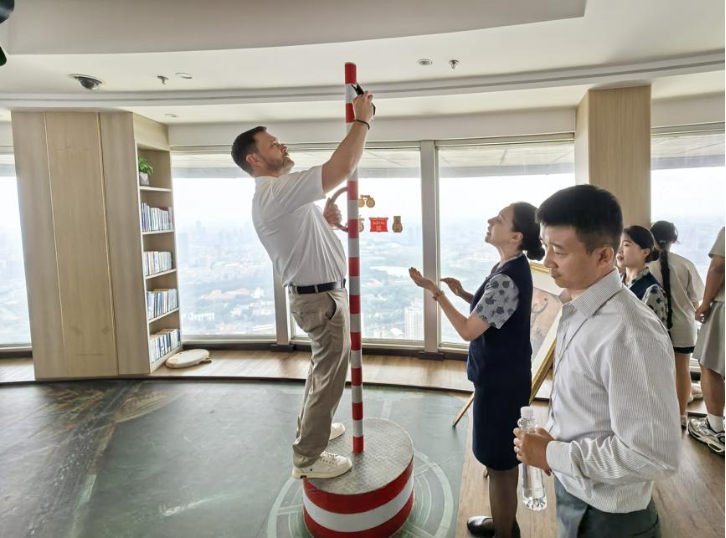St. Petersburg strengthens SCO ties at Tianjin summit

Dmitrii Aplesnin, head of the Regional Trade and Economic Cooperation Department of the Committee for External Relations of St. Petersburg, takes a selfie at the Tianjin Radio and Television Tower on Wednesday. [Photo by Yan Dongjie/chinadaily.com.cn]
Saint Petersburg's participation in the recent World Mayors Dialogue · SCO Cities Summit in Tianjin underscores a meaningful step toward enhancing ties between the city and its Chinese counterparts within the Shanghai Cooperation Organization, Russian officials said.
More than 100 officials, scholars, and entrepreneurs hailing from SCO member countries gathered in Tianjin for the summit, which opened on Tuesday. Dmitrii Aplesnin, head of the Regional Trade and Economic Cooperation Department of the Committee for External Relations of St. Petersburg, attended the summit despite a 60-hour journey encumbered by flight disruptions.
"This forum held before the upcoming SCO Summit in the autumn is certainly very important. St. Petersburg won't miss this event and hopes to promote mutual understanding and foster more cooperation with Chinese cities and cities of other SCO member countries," he said.

Dmitrii Aplesnin tours Tianjin on Wednesday after the World Mayors Dialogue · SCO Cities Summit. [Photo by Yan Dongjie/chinadaily.com.cn]
This was Aplesnin's first visit to China, and he praised the country's urban planning and technological advancements, calling them valuable models for other SCO member states. He also noted the similarities between St. Petersburg and Tianjin, suggesting both cities were prepared to sign new cooperation agreements.
"The construction of a smart city involves various aspects, such as technology and the digital economy," Aplesnin explained."Typically, a leading field in a particular city can advance the development of a smart city, and the successful experiences of this city can, in turn, drive the development of cities in other SCO member states.
"For instance, China has made rapid technological advancements and maintains a high quality in many sectors, such as electronic products, city planning, and smart traffic, while other countries may have their own advantages in different fields. We can learn from each other, share experiences, and collaborate."
The exchange of technological expertise in Tianjin included Aplesnin showcasing Chinese gadgets, such as a Huawei foldable phone and smartwatch. It was highlighted as a key aspect of SCO collaboration. He stressed that mutual learning, sharing experiences, and cooperation across technological fields in the form of tax benefits would significantly support member countries.
Alexander Beglov, governor of St. Petersburg, said in a video address to the summit that with agreements in place with six Chinese partner regions, the city aims to leverage Chinese expertise in technology transfer, investments, and production localization to drive industrial cooperation and investments within the SCO framework.
He mentioned that China is the top trading partner and import source for St. Petersburg and a key strategic partner of the city.
The establishment of the International Center for Industrial Cooperation for SCO Countries at St. Petersburg State University of Economics signifies a proactive approach towards expanding economic collaboration and fostering dialogue among business communities within SCO member states, Beglov said.
As St. Petersburg and China continue to explore avenues for cooperation within the SCO, the organization's role in promoting economic growth, technological advancement, and cultural exchange on a global scale becomes increasingly vital, Aplesnin said.
Over the 24 years of its development, the SCO has expanded from six member states to 26 countries, becoming a regional cooperation alliance with the largest territory and population in the world.
"It is heartening that on the eve of the most important summit on the Eurasian continent in 2025, we can discuss the strengthening of cooperation between the key cities of SCO countries at the interregional level," Beglov said.
"Such cooperation will not only enhance the efficiency of urban management but also create new opportunities for the economic development of cities, improve the quality of life for the population, and strengthen interregional ties between SCO member countries," he said.
 京公网安备 11010802027341号
京公网安备 11010802027341号